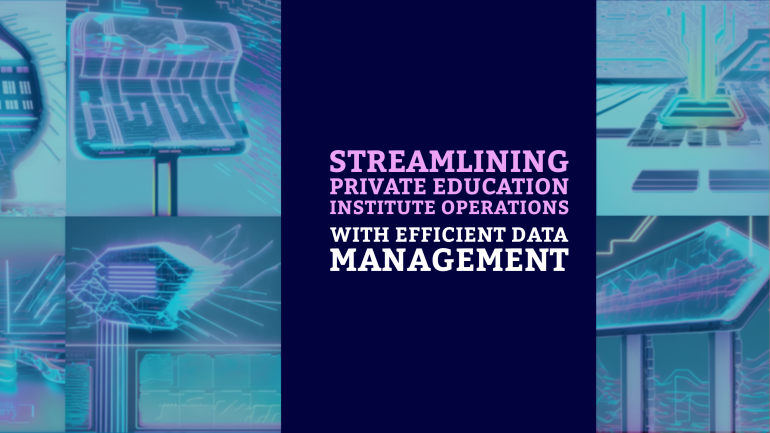Table of Contents
TL;DR: Boosting Private Education Institutes with Effective Data Management
- Centralized data management is crucial for streamlining operations in private education institutes, ensuring quick access to accurate information. Implementing automated systems can help reduce administrative tasks, minimize errors, and improve overall operational efficiency.
- Data security measures are imperative to protect sensitive information, comply with regulations, and build trust among stakeholders.
- Analyzing data trends can provide valuable insights for decision-making, resource allocation, and improving student outcomes in private educational institutions.
- Ongoing staff training is necessary to ensure that employees understand the importance of data management practices and are equipped to utilize systems effectively.
Most private education institutes face challenges in managing vast amounts of data efficiently. In today’s digital age, efficient data management is crucial for the smooth operation of educational facilities. From student records to financial transactions, having a streamlined system in place can improve productivity, increase accuracy, and enhance decision-making processes.
Understanding the Educational Data Landscape
If private education institutes are to streamline their operations efficiently, a thorough understanding of the educational data landscape is important. Educational data plays a crucial role in decision-making processes, academic planning, student management, and overall institutional effectiveness. By grasping the types of data present and the challenges they pose, institutes can optimize their data management strategies for improved outcomes.
Types of Data in Private Education Institutes
Educational data in private institutions can be categorized into various types, including student information, performance records, teaching materials, administrative documents, and financial records. Each type of data serves a distinct purpose in the educational ecosystem and contributes to the seamless functioning of the institute. The interconnectedness of these data types is vital for holistic decision-making and operational efficiency.
| Student Information | Demographic details, enrollment history, attendance records |
| Performance Records | Grades, assessments, progress reports |
| Teaching Materials | Curriculum, lesson plans, learning resources |
| Administrative Documents | Policies, procedures, accreditation documents |
| Financial Records | Budgets, tuition fees, payment records |
Challenges in Managing Educational Data
Challenges in managing educational data can stem from various sources, including data security risks, data silos, data accuracy, data integration complexities, and compliance issues. These challenges not only impede efficient operations but also pose significant risks to an institute’s reputation and legal standing. Managing educational data effectively requires robust systems, dedicated resources, and a proactive approach to data governance.
Key Components of an Effective Data Management Strategy
Establishing Clear Data Governance
There’s no denying the importance of establishing clear data governance within a private education institute. Effective data governance lays the foundation for managing data assets, ensuring data quality, and mitigating risks associated with data misuse. It involves developing policies, procedures, and guidelines for data management, defining roles and responsibilities, and setting up protocols for data access and security.
Data Quality and Consistency
Any successful data management strategy hinges on maintaining high data quality and consistency. Inaccurate or inconsistent data can lead to misguided decision-making, erode trust in data-driven insights, and ultimately hinder operational effectiveness. Implementing data quality controls, conducting regular data audits, and fostering a culture of data stewardship are vital aspects of ensuring data accuracy and consistency.
This underscores the importance of having standardized data formats, validation rules, and data cleansing processes in place to prevent data discrepancies. By prioritizing data quality and consistency, private education institutes can enhance the reliability and relevance of their data assets, ultimately leading to improved decision-making processes and operational efficiency.
Integration and Interoperability Solutions
This component of an effective data management strategy focuses on integrating various data sources and systems within a private education institute to enable seamless data flow and interoperability. Integration and interoperability solutions facilitate the consolidation of disparate data sets, streamline data processing workflows, and support real-time data access and analysis.
One key consideration for integration and interoperability solutions is to ensure compatibility with existing systems and data formats, as well as scalability to accommodate future data growth. By implementing robust integration and interoperability solutions, private education institutes can break down data silos, improve cross-functional collaboration, and harness the full potential of their data assets for informed decision-making.
Leveraging Technology for Data Management
Educational Data Management Systems (EDMS)
With the advancement of technology, private education institutes can now streamline their operations more effectively through Educational Data Management Systems (EDMS). These systems are designed to efficiently collect, store, manage, and analyze vast amounts of data related to student enrollment, courses, grades, and more. EDMS can significantly enhance the decision-making process by providing real-time insights and reports to administrators and educators. By utilizing EDMS, institutions can improve their overall efficiency and enhance the quality of education delivery.
Cloud-Based Solutions for Scalability and Accessibility
An increasing number of private education institutes are turning to cloud-based solutions for enhancing scalability and accessibility in data management. Cloud-based solutions offer the flexibility to access data from anywhere, at any time, and on any device, making collaboration and data sharing among staff members seamless and efficient. These solutions also ensure data security and backup, reducing the risk of data loss and unauthorized access.
Systems that leverage cloud-based solutions can easily scale according to the institute’s requirements, whether it’s increasing storage capacity or accommodating a growing number of users. The scalability and accessibility offered by cloud-based solutions make them a valuable asset for private education institutes looking to streamline their operations and improve overall productivity.
Role of Analytics in Enhancing Operational Efficiency
Data-Driven Decision Making in Private Education
Once again, the role of analytics in private education institutions cannot be understated. Data-driven decision making is the cornerstone of operational efficiency. By utilizing data analytics tools, private education institutes can extract valuable insights from their student records, financial data, and operational metrics, enabling informed decision-making processes. The ability to access and analyze real-time data empowers administrators to identify trends, anticipate challenges, and capitalize on opportunities.
Implementing Predictive Analytics for Strategic Planning
Predictive analytics plays a vital role in enhancing operational efficiency by enabling private education institutes to forecast future trends and outcomes. By leveraging advanced algorithms and machine learning models, institutions can predict student enrollment patterns, identify at-risk students, optimize course offerings, and allocate resources effectively. This proactive approach to decision making based on data-driven insights helps institutions stay ahead of the curve and make strategic decisions that drive success.
Implementing predictive analytics for strategic planning requires a dedicated team of data analysts and experts in the field. These professionals work collaboratively with administrators to develop data models, conduct scenario analyses, and provide actionable recommendations based on the predictive insights gained. By embracing predictive analytics, private education institutes can revolutionize their strategic planning processes and achieve sustainable growth in a competitive landscape.
Ensuring Data Security and Privacy
Compliance with Data Protection Regulations
Security: Unlike other industries, private educational institutes handle sensitive student and staff information that must be securely protected. Compliance with data protection regulations such as the Family Educational Rights and Privacy Act (FERPA) and the General Data Protection Regulation (GDPR) is crucial to maintaining the integrity and confidentiality of this data. Violating these regulations could result in severe penalties and damage to the institute’s reputation.
Best Practices for Data Security in Private Educational Institutes
For: Implementing robust data security practices is crucial for private educational institutes to mitigate the risks associated with cyber threats and unauthorized access to confidential information. Encrypting data, regularly updating security software, conducting security audits, and providing staff training on data protection are some of the best practices that can enhance the overall security posture of the institute.
The: Failure to secure sensitive data in private educational institutes can lead to severe consequences such as data breaches, identity theft, and financial loss. It is imperative for institutes to prioritize data security measures to safeguard the privacy and confidentiality of the information they hold.
Managing Student Information and Academic Records
Student Information System (SIS) Features and Advantages
Keep your private education institute operations efficient by investing in a robust Student Information System (SIS). A comprehensive SIS is designed to centralize and manage all student-related data, such as personal information, attendance records, grades, and much more. The advantage of using an SIS is that it allows for easy access to real-time student information, which can help administrators and educators make informed decisions quickly.
Streamlining Academic Record Keeping and Reporting
Information plays a critical role in streamlining academic record keeping and reporting processes at private education institutes. By implementing a digital system to manage academic records, institutes can significantly reduce the time and effort required to update and maintain student records. Additionally, digital systems enable seamless generation of reports, including transcripts, progress reports, and performance analytics.
It is important to ensure that the chosen system for academic record management complies with data protection regulations to safeguard student privacy. By leveraging technology to streamline academic record keeping, institutes can not only enhance operational efficiency but also improve transparency and accountability in managing student information.
Faculty and Staff Management through Efficient Data Systems
After ensuring streamlined operations in private education institutes, the focus shifts to managing the faculty and staff efficiently. This is crucial for maintaining a high standard of education delivery. Utilizing efficient data systems can significantly improve the management of human resources in these institutions.
Human Resource Information Systems (HRIS) in Education
Systems that integrate human resource management with information technology can revolutionize how private education institutes handle their faculty and staff. HRIS in education provides a centralized platform for managing employee data, such as personal details, qualifications, performance records, and training histories. By automating routine HR tasks and providing real-time access to critical information, HRIS streamlines operations and enhances decision-making processes.
Role of Data in Professional Development and Performance Evaluation
HRIS plays a vital role in facilitating professional development and performance evaluation of faculty and staff in private education institutes. Through data-driven insights, administrators can identify skill gaps, track training needs, and establish performance benchmarks. By leveraging this data, institutes can design targeted professional development programs and conduct objective performance evaluations, leading to continuous improvement and a high standard of education delivery.
Another crucial aspect of utilizing data in professional development and performance evaluation is the ability to generate customized reports for individual faculty and staff members. These reports can provide detailed insights into areas of improvement, training progress, and performance metrics, enabling a personalized approach to enhancing skills and capabilities.
Financial Data Management
Automating Financial Operations for Cost-Effective Management
Your private education institute can benefit greatly from automating financial operations. By leveraging technology, you can streamline processes such as invoicing, payment processing, and financial reporting. This automation reduces manual errors, saves time, and ensures accuracy in your financial data management. With automated systems in place, you can achieve cost-effective management of your institute’s finances, allowing you to allocate resources more efficiently towards improving education quality and student experience.
Budgeting and Financial Planning Using Data Insights
Any private education institute must prioritize budgeting and financial planning to sustain long-term growth and success. Leveraging data insights is crucial in making informed decisions regarding resource allocation, revenue generation, and expense management. By analyzing data trends and patterns, you can create realistic budgets and effective financial plans that align with your institute’s strategic goals and objectives.
Management of budgets and financial planning can be complex in the private education sector, considering factors such as fluctuating enrollment numbers and changing market demands. Utilizing data insights allows you to adapt to these changes effectively and make proactive decisions to ensure financial stability and sustainability.
Stakeholder Engagement and Communication
Despite the numerous challenges faced by private education institutes, effective stakeholder engagement and communication play a crucial role in ensuring smooth operations and fostering growth. Engaging with various stakeholders, including parents, students, and external partners, is crucial for maintaining trust and building strong relationships within the educational community.
Enhancing Parent and Student Communication Channels
Stakeholder involvement is key to the success of any private education institute. As such, creating robust communication channels with parents and students is paramount. By utilizing technology such as dedicated portals, mobile apps, and regular newsletters, institutes can keep parents informed about academic progress, upcoming events, and important announcements. Similarly, establishing open lines of communication with students through feedback mechanisms and consultation sessions can foster a supportive learning environment.
Collaborating with External Educational Partners
An integral aspect of efficient data management in private education institutes is collaborating with external educational partners. This collaboration can include sharing best practices, resources, and expertise to enhance the quality of education provided. By fostering partnerships with other educational institutions, industry experts, and organizations, institutes can access a wider network of resources and opportunities for growth.
Educational collaborations with external partners can lead to innovative teaching methods, shared research initiatives, and professional development opportunities for staff. By leveraging the strengths of external partners, private education institutes can stay updated on industry trends and offer students a well-rounded and competitive educational experience.
Adapting to Emerging Trends and Future Proofing
Keeping Up with Technological Advancements
Now, in the rapidly evolving landscape of education, private education institutes must prioritize keeping up with technological advancements to stay competitive and meet the changing needs of students. With advancements such as AI, machine learning, and data analytics becoming more prevalent in the education sector, institutes need to invest in technologies that can streamline operations, enhance the learning experience, and improve overall efficiency.
Preparing for Future Educational Challenges through Data Readiness
Readiness with institutions that are prepared for future educational challenges through data readiness will be better equipped to address issues such as personalized learning, digital literacy, and remote education. By implementing robust data management systems that enable the collection, analysis, and utilization of student and operational data, institutes can leverage insights to enhance teaching strategies, student engagement, and administration efficiency.
A proactive approach to data readiness involves continually upgrading systems to adapt to changing educational trends and regulatory requirements. By establishing a culture of data-driven decision-making and regularly assessing and improving data processes, private education institutes can future-proof their operations and remain at the forefront of the education sector.
Conclusion
So, it is evident that efficient data management plays a vital role in streamlining the operations of private education institutes. By implementing automated systems for student enrollment, communication, and academic performance tracking, educational institutions can greatly improve their productivity and decision-making processes. With the right data management tools in place, administrators can focus more on strategic planning and student success initiatives rather than getting bogged down by manual data entry and analysis.
Moreover, by harnessing the power of data analytics, private education institutes can gain valuable insights into student behavior, learning outcomes, and operational efficiencies. This data-driven approach not only enhances the overall student experience but also helps institutes stay competitive in a rapidly evolving education landscape. In short, investing in efficient data management solutions is crucial for private education institutes looking to optimize their operations and deliver high-quality educational services.
FAQ
Q: What are the key benefits of streamlining private education institute operations with efficient data management?
A: The key benefits include improved administrative efficiency, enhanced decision-making based on data-driven insights, better student outcomes, increased cost savings, and streamlined regulatory compliance.
Q: How can efficient data management improve administrative efficiency in private education institutes?
A: Efficient data management can automate routine tasks, enhance communication between different departments, enable better resource allocation, and streamline the enrollment and admissions process.
Q: What role does data-driven insights play in improving decision-making in private education institutes?
A: Data-driven insights help administrators identify trends, assess performance metrics, anticipate future needs, and make informed decisions regarding curriculum development, student support services, and strategic planning.
Q: How does efficient data management contribute to better student outcomes in private education institutes?
A: By tracking student progress, identifying at-risk students, personalizing learning experiences, and providing timely interventions, efficient data management can lead to improved academic performance, higher retention rates, and overall student success.
Q: In what ways can efficient data management help private education institutes save costs and ensure regulatory compliance?
A: Efficient data management reduces manual errors, eliminates duplicate data entry, centralizes information storage, facilitates auditing processes, and ensures compliance with data protection regulations, leading to cost savings and mitigating risks associated with non-compliance.




